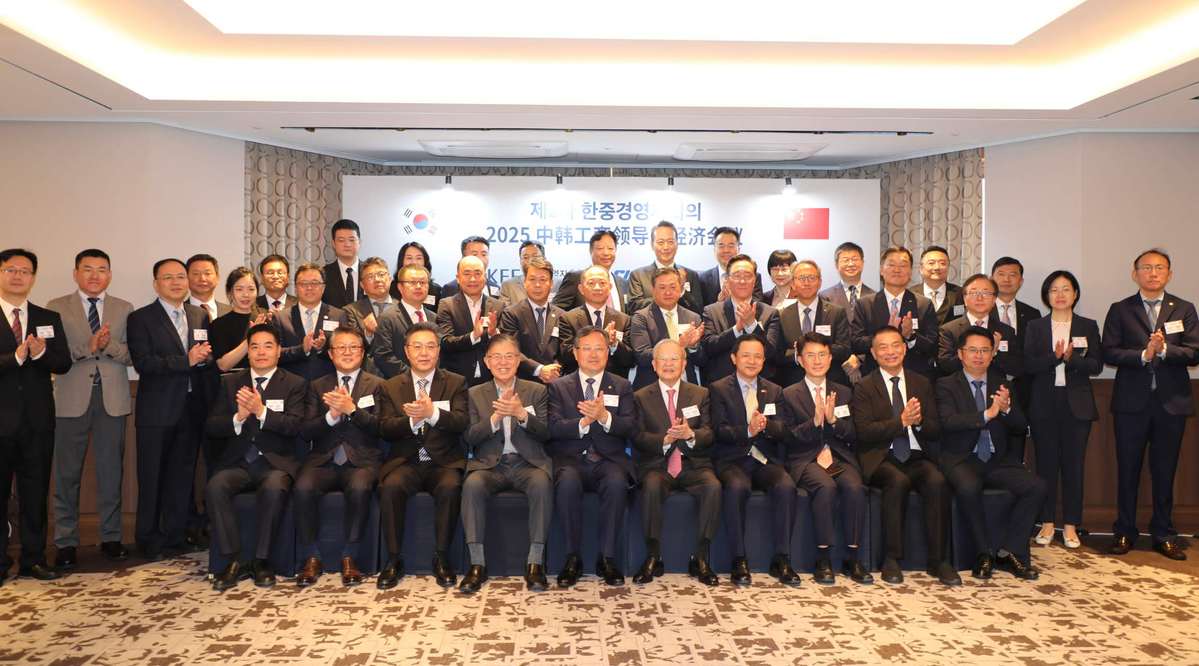
With China and South Korea serving as core nodes in East Asian and global supply chains, win-win cooperation between the two countries is a key driver of the world economy, according to officials and business leaders.
"The industrial and supply chains of China and South Korea are deeply intertwined," Chinese Ambassador to South Korea Dai Bing said.
"This mutually beneficial partnership has not only brought substantial benefit to the two peoples, but also made significant contributions to regional peace, stability, and prosperity."
Speaking at a meeting of South Korean and Chinese business leaders in Seoul on Sept 18, Dai said the two countries are both supporters and beneficiaries of free trade and globalization, and they should strengthen solidarity to resist protectionism and promote multilateral cooperation.
Held on Sept 17-18, the meeting was co-organized by the China International Council for the Promotion of Multinational Corporations and the Korea Enterprises Federation.
More than 40 representatives from leading Chinese and South Korean companies attended the meeting to discuss economic cooperation and collaboration in emerging fields, including the digital and green economy, artificial intelligence, and biotech.
In the 33 years since the establishment of diplomatic relations between China and South Korea, bilateral trade has increased more than 60-fold, reaching $328 billion in 2024. The cumulative two-way direct investment also exceeded $110 billion, according to the Chinese embassy.
"Since China and South Korea first signed a currency swap agreement in 2008 … the current swap scale has reached 400 billion yuan ($56 billion), which greatly improved the convenience of cross-border trade and investment, while strengthening regional financial security," Bank of China President Zhang Hui said.
Zhang added that the bank will actively leverage its global presence and strengths to promote policy directions and business opportunities, building "a bridge of friendship" to enhance the resilience of cooperation, and achieve mutual benefits for businesses on both sides.
Ge Wei, the China International Council for the Promotion of Multinational Corporations' specially invited vice-president, said that complementary cooperation between Chinese and South Korean industrial chains is an inherent requirement for the economic development of both countries.
Ge said it is vital for Chinese and South Korean enterprises to conduct in-depth discussions on supply chain cooperation.
Businesses should play a central role in enhancing supply chain cooperation between South Korea and China and strengthening collaboration in industrial sectors, Park Jung-won, South Korea's deputy trade minister of the Ministry of Trade, Industry and Energy, said.
As South Korean and Chinese entrepreneurs face challenges such as protectionism, the two countries should work together to build a stable and predictable business environment, Sohn Kyung-shik, chairman of South Korean conglomerate CJ Group and the Korea Enterprises Federation, said.
In particular, Sohn said companies on both sides should deepen cooperation in cutting-edge technological innovation and emerging industries, including artificial intelligence and robotics.
Through cooperation in projects and technology, Sohn said he hopes South Korean and Chinese companies can achieve supply chain stability, explore new markets, and jointly create future growth momentum.
微信扫描下方的二维码阅读本文


